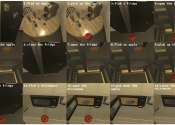New 'fabric' converts motion into electricity
Scientists at NTU Singapore have developed a stretchable and waterproof "fabric" that turns energy generated from body movements into electrical energy.
Jun 2, 2022
0
757
Energy & Green Tech

Scientists at NTU Singapore have developed a stretchable and waterproof "fabric" that turns energy generated from body movements into electrical energy.
Jun 2, 2022
0
757
Electronics & Semiconductors

Plants can't speak up when they are thirsty. And visual signs, such as shriveling or browning leaves, don't start until most of their water is gone. To detect water loss earlier, researchers reporting in ACS Applied Materials ...
May 4, 2022
0
247
Software

In honor of National Teacher Appreciation Day in the United States, Microsoft has announced the release of several learning tools designed to support both teachers and students in a hybrid in-person, online educational environment ...
Software

Google engineer Andy Nguyen is reporting via a Twitter thread that a new security vulnerability has been found in Linux operating systems that run a Bluetooth software stack called BlueZ. Nguyen has named the vulnerability ...
Consumer & Gadgets

The Raspberry Pi Foundation is stepping up production of its Zero single-core boards to help combat the coronavirus.
Machine learning & AI

Researchers have designed an artificial intelligence (AI) model that is better able to predict how much students are learning in educational games. The improved model makes use of an AI training concept called multi-task ...
Feb 5, 2020
0
73
Robotics

Earlier this month, Sony Electronics announced an abbreviated take on the KOOV robotics kit that it showed in a 2017 video as a robotics and coding educational kit, made up of blocks, sensors, motors, actuators, and a companion ...
Software

To succeed at "Lure of the Labyrinth," a video game created by designers in MIT's Education Arcade, players rescue pets from an underground lair inhabited by monsters. In so doing, they solve mathematical puzzles, decipher ...
Sep 20, 2018
0
15
Robotics

If instructed to "Place a cooled apple into the microwave," how would a robot respond? Initially, the robot would need to locate an apple, pick it up, find the refrigerator, open its door, and place the apple inside. Subsequently, ...
Apr 26, 2024
0
16
Business

U.S. land-based and offshore wind energy markets are expected to grow significantly over the next few decades. With this growth, the demand for properly trained wind energy workers will also increase to meet national deployment ...
Apr 19, 2024
0
10
Education in its broadest sense is any act or experience that has a formative effect on the mind, character, or physical ability of an individual. In its technical sense education is the process by which society deliberately transmits its accumulated knowledge, skills and values from one generation to another through institutions.
Teachers in such institutions direct the education of students and might draw on many subjects, including reading, writing, mathematics, science and history. This process is sometimes called schooling when referring to the education of youth. Teachers in specialized professions such as astrophysics, law, or zoology may teach only a certain subject, usually as professors at institutions of higher learning. There is also education in fields for those who want specific vocational skills, such as those required to be a pilot. In addition there is an array of education possible at the informal level, e.g., at museums and libraries, with the Internet, and in life experience.
The right to education has been described as a basic human right: since 1952, Article 2 of the first Protocol to the European Convention on Human Rights obliges all signatory parties to guarantee the right to education. At world level, the United Nations' International Covenant on Economic, Social and Cultural Rights of 1966 guarantees this right under its Article 13.
This text uses material from Wikipedia, licensed under CC BY-SA